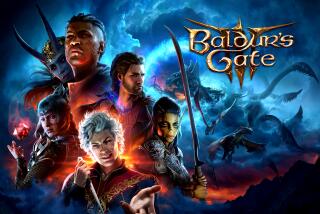Strangers in the Night
- Share via
How much did I love addictive CD-ROM games such as Myst and SimCity and Doom? Let me count the hours . . . hours spent alone with the computer, the cathode rays an eternal sun and each game’s level marking the passing days.
Now I rarely toil alone against computer-generated monsters and puzzles, instead opting for games against real-live opponents found over the Internet. It wasn’t an easy transition to play against strangers, not knowing how my skills would stack up. Plus, in action games like Quake, you’re never sure if your bad connection might spell certain defeat.
Online gaming is hyped as more challenging gameplay with a simple start-up process. As a bonus, you can meet people from around the world who share your passion. You choose a name or handle, then can chat with others while trying to blast them in Duke Nukem, join forces in Diablo or run the table in poker. Though you might not be certain if your opponent is a 12-year-old boy in Pasadena or a 47-year-old mother of two in Peru, there’s a feeling of companionship, of we’re-all-in-this-together.
It’s hard to generalize about online gaming, because dozens of services and hundreds of games are available, but in my six months of Net gaming, I’ve had a good dose of difficulties. Most games and services require long downloads of multi-megabyte software, and many are beta quality (read: unfinished) work. The good news is you can play for free during beta testing, but the bad news is that games crash and you often get busy signals.
Many services, such as Total Entertainment Network (TEN) and Mpath Interactive, charge monthly and hourly fees above and beyond your Internet connection. That means you buy the games for $50 a pop, on top of Net access fees.
To avoid those extra charges, many CD-ROM companies have set up gratis online services for their shrink-wrapped products. Westwood has such a service for Red Alert, and Blizzard has battle.net for Diablo. Players are flooding the freebie services, raising doubts over whether the publishers can support so many users without charging.
More are coming. America Online is readying CyberPark, developed by the people at ImagiNation Network, and Microsoft is planning a similar venture. CyberPark will let people choose an avatar representation of themselves, then walk through a computer-generated “town,” chatting with other people, playing a variety of action and board games, and even shopping in a virtual mall.
Jupiter Communications predicts online gaming will be a $1.6-billion industry by 2000. So I won’t be tearing myself from the computer screen any time soon--but at least I’ll be with kindred souls who are wasting just as much quality time as I am.
Mark Glaser is a freelance writer and critic based in San Francisco. E-mail him at McGlaze@aol.com.
(BEGIN TEXT OF INFOBOX / INFOGRAPHIC)
Internet Guides to Online Games
* https://www.gamespot.com/features/multiplayer/index.html
* https://www.tc.umn.edu/nlhome/m041/fran0264/mpog/index.htm
* https://www.happypuppy.com/mpog/index.html
More to Read
The biggest entertainment stories
Get our big stories about Hollywood, film, television, music, arts, culture and more right in your inbox as soon as they publish.
You may occasionally receive promotional content from the Los Angeles Times.










